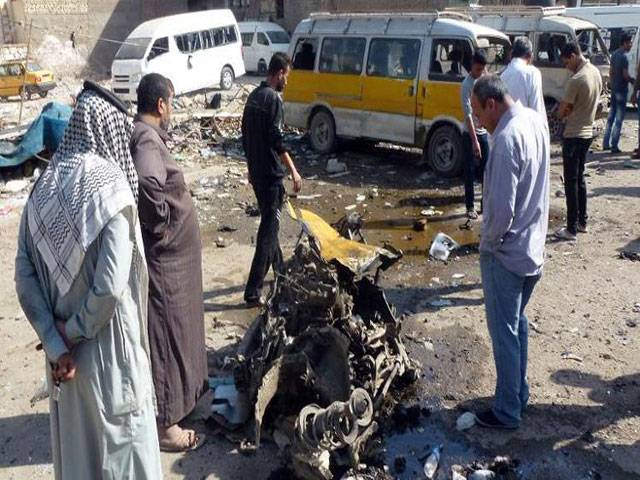BAGHDAD : Three suicide bombings killed 14 Iraqi security force members overnight, officials said Wednesday, the deadliest in a series of attacks that left 35 people dead in two days.
The attacks come as Iraq witnesses its worst violence since 2008, a surge in unrest that has killed more than 5,400 people this year that has persisted despite authorities having carried out a swathe of operations and implemented tightened security measures. Since the beginning of 2013, AFP has recorded just 16 days in which there were no deaths from violence in Iraq, the most recent of which was May 24.
The months-long surge in unrest drew condemnation from the Pope on Wednesday in his regular address to tens of thousands of worshippers massed in Vatican City.
On Wednesday, attacks in Sunni-majority areas of Baghdad and outside the capital left nine people dead and more than 20 others wounded, according to security and medical officials.
The deadliest of the attacks was in Abu Ghraib, just west of Baghdad, where two people were killed in a roadside bomb, while a magnetic “sticky bomb” attached to a car in the Baghdad neighbourhood of Adhamiyah killed a policeman.
Attacks also struck the restive central city of Baquba and nearby towns, the former insurgent bastion of Fallujah to the west of Baghdad, and the cities of Mosul, Kirkuk and Tikrit, all to the north of the capital. The violence followed suicide bombings the previous night that killed 19 people, among them 14 security forces members.
In Tarmiyah, north of Baghdad, two suicide bombers attacked a house where a security meeting was taking place at about 11:30 pm (2030 GMT) on Tuesday, killing 11 people and wounding at least 20.
One bomber detonated explosives at a gate leading to the house, while the second managed to enter the building itself.
The dead were four soldiers, including a brigadier general, three police, among them a lieutenant colonel, and four Sahwa anti-Al-Qaeda fighters.
And near the northern city of Mosul, a suicide bomber detonated a vehicle rigged with explosives near a police checkpoint, killing eight people, among them three police, and wounding 25.
Militants, including those linked to Al-Qaeda, frequently target Iraqi security forces and other government employees.
Some 30 suicide bombers have managed to detonate explosives in attacks this month, while others were killed before they could do so.
Other attacks in Iraq killed seven more people on Tuesday, as Prime Minister Nuri al-Maliki left for a visit to Washington, during which he will push for increased US support for the country’s fight against insurgents.
The Iraqi government has so far failed to curb the heightened unrest this year, and experts say Baghdad should turn to longer-term efforts that build trust among citizens, especially members of the country’s Sunni minority.
Widespread discontent among Iraq’s Sunnis, who complain of being politically isolated and unfairly targeted by security forces, has been a major factor in the unrest, along with the civil war in neighbouring Syria, which has bolstered militants.
The level of violence rose sharply after security forces stormed a Sunni protest camp in northern Iraq in April, sparking clashes in which dozens died.
And while authorities have made some concessions aimed at placating the protesters and Sunnis in general, such as freeing prisoners and raising the salaries of Sunni anti-Al-Qaeda fighters, the underlying issues remain unaddressed.
More than 700 people have been killed in violence so far this month, and over 5,400 since the beginning of the year, according to AFP figures based on security and medical sources.
Friday, April 19, 2024
Suicide bombers hit Iraq security as attacks kill 35

8:27 AM | April 19, 2024
8:09 AM | April 19, 2024
Formula 1 returns to China for Round 5
9:05 PM | April 19, 2024
Germany head coach Julian Nagelsmann extends contract till 2026 World Cup
9:00 PM | April 19, 2024
IMF urges Italy, France to spend less, Germany to loosen purse strings
8:57 PM | April 19, 2024
PM calls UAE president, admires Emirati leadership's response to recent Dubai rains
8:55 PM | April 19, 2024
Church leader calls for including Christians in Gandhara Corridor
8:50 PM | April 19, 2024
A Tense Neighbourhood
April 19, 2024
Dubai Underwater
April 19, 2024
X Debate Continues
April 19, 2024
Hepatitis Challenge
April 18, 2024
IMF Predictions
April 18, 2024
Kite tragedy
April 19, 2024
Discipline dilemma
April 19, 2024
Urgent plea
April 19, 2024
Justice denied
April 18, 2024
AI dilemmas unveiled
April 18, 2024
ePaper - Nawaiwaqt
Advertisement
Nawaiwaqt Group | Copyright © 2024





